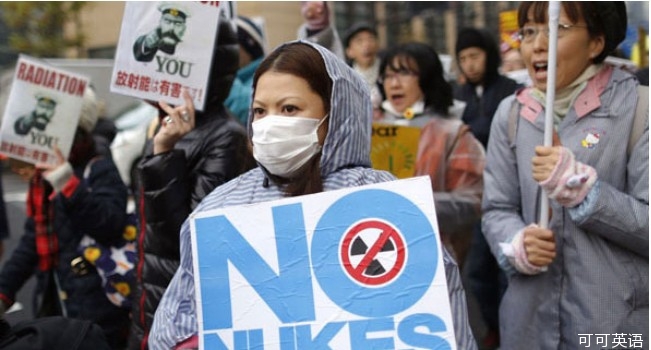
Business Business under Japan's new government Are nukes back?
商業 日本新政府背后的交易 重啟核電站?
The nuclear industry may get a reprieve
核工業可能被判緩刑
ELECTION victory celebrations in Japan are usually sober affairs: no booze, the obligatory "Banzai!", and the endearing habit of holding aloft a fresh sea bream, which is a good-luck charm and a tasty ingredient for soup to ladle out to supporters.
日本人慶祝大選勝利向來淡定:不必酒宴相慶, 只需大呼"萬歲!",這被視為好運的呼聲,以及令人喜愛的習俗:奉上一條新鮮的海鯉,烹制出美味的海鯉湯,供支持者們伏惟尚饗。
Not so on the Tokyo Stock Exchange.
東京證券交易所也不例外。
Jubilation at the landslide win of Shinzo Abe's Liberal Democratic Party (LDP) on December 16th raised share prices to the rafters.
12月16日自民黨主席安倍晉三以壓倒性的勝利贏得選舉,股價以漲幅收盤。
The markets were celebrating a slide in the yen, which may make ailing Japanese exporters such as Sharp, an electronics firm, more competitive.
市場則以日元貶值來慶祝這場勝利,這樣可以讓病態的日本出口企業,如電子公司夏普,更具競爭力。
Sotto voce, there was also joy that Japan's "nuclear village" appears to be back in business.
噓!這同樣對日本 "核村莊"回歸經營狀態是個喜訊。
During earlier decades in power, LDP governments backed nuclear energy to the hilt, brushing aside worries about safety.
自民黨政府在早期幾十年的執政期間,就曾置民眾對完全問題的擔心于不顧,不遺余力地支持核能。
In the two days after the election the shares of Tokyo Electric (TEPCO), the owner of the Fukushima Dai-Ichi nuclear power plant, surged by 56%.
大選過后的兩天時間里,擁有福島第一核電站的東京電力(TEPCO),其股價飆漲了56%。
Investors bet that the new government would allow Japan's reactors, almost all of which have been idle since being struck by an earthquake in 2011, to restart.
投資者們打賭說新政府會重啟因受2011年地震打擊而閑置的日本核反應堆。
That may be wishful thinking.
這恐怕有些癡心妄想了。
Mr Abe may want to steer clear of the sensitive nuclear issue until upper-house elections in mid-2013.
在2013年中期舉行上議院選舉之前,安倍首相可能不愿談及原子能這樣的敏感話題。
If so, a time frame agreed with TEPCO's 77 banks for restarting the first of its seven Kashiwazaki-Kariwa reactors in Niigata prefecture may be missed.
若真是這樣,與東京電力77家銀行達成的關于重啟位于新瀉縣七個柏崎刈羽核反應堆中一個的時間期限可能錯過。
TEPCO says each stalled reactor costs it 100 billion yen ($1.2 billion) in lost profit each year.
東京電力公司表示,每一個停頓反應堆造成每年損失100億日元(約合12億美元)利潤。
Furthermore, the nuclear industry now has an independent watchdog, the Nuclear Regulation Authority, which is showing teeth.
此外,核工業現在已經有獨立的監管部門,呲牙相向的原子能規制委員會。
Its investigators have so far issued seismic warnings against two nuclear power plants, which may lead to their permanent mothballing.
迄今為止,其調查人員已經對兩個核電站發布了地震預警,這可能導致這兩個核電站永久封存。
By law, even an LDP government should be unable to boss the watchdog around.
根據法律,即使自民黨政府亦無權指揮監管部門圍著政府轉。
Yet a share-price rally may still be warranted.
然而股價反彈可能仍然言之過早。
TEPCO's share price is barely a tenth of what it was before the disaster.
東京電力的股價只不過是災難前的十分之一。
That reflects a genuine fear that the company may go bust.
這也反映出對該公司可能破產確實存在擔憂。
Surely, investors mutter, the LDP remains chummy enough with Japan's nuclear utilities not to let any of them collapse into bankruptcy?
確實,投資者們揣度的是,自民黨與日本原子能事業親密無間的關系就不會放任他們中的任何一家公司倒閉嗎?











